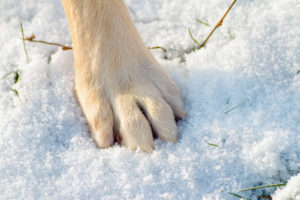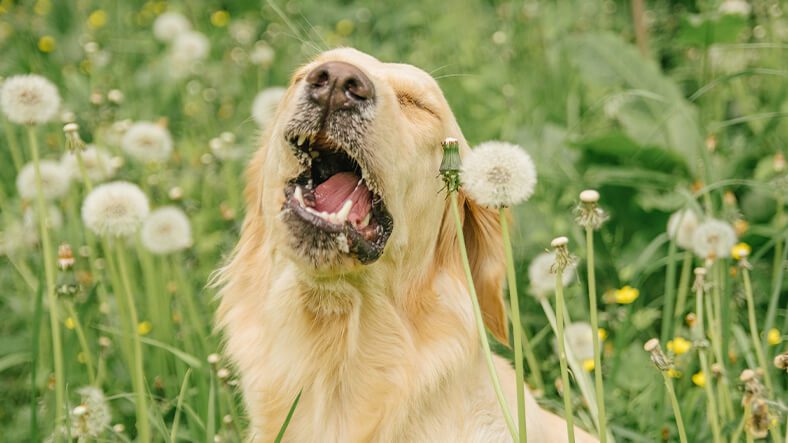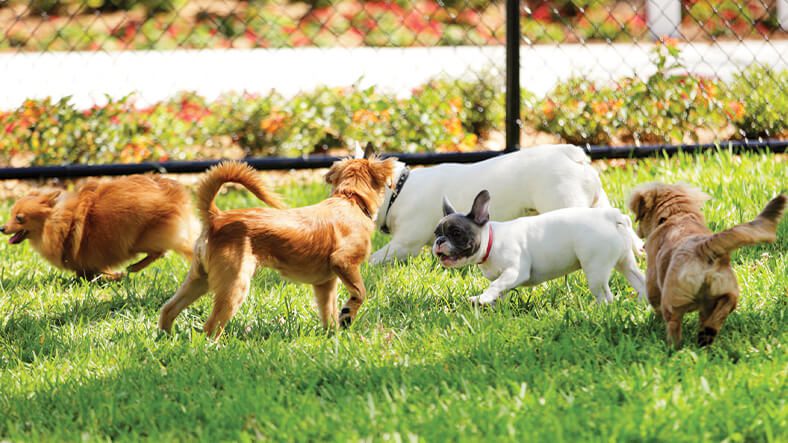Is Salt Bad for My Dog’s Paws in Plymouth Meeting, PA?
Winter is hard on all of us. The days are shorter, it gets so cold that layers don’t even help, and the dog still needs to be walked even when he doesn’t want to go out. While you’re out walking during winter, your dog could be exposed to rock salt that’s used to treat snow and ice on the roads, sidewalks, and driveways. The short answer to “is salt bad for my dog’s paws?” is, “Yes”.

What Makes Salt Bad for Dog Paws in Plymouth Meeting, PA?
Rock salt is made of sodium chloride or calcium chloride which are both types of salt. It can actually cause irritation and even chemical burn on your dog’s paws. And, if your dog eats the salt, it can result in mouth burns, indigestion, and diarrhea.
As you go for your walk in Plymouth Meeting, discourage your pup from eating and licking at snow, ice, and anything else on the ground. You will definitely have to be more attentive to your dog on walks during the winter months to avoid him ingesting harmful amounts of these toxic substances.
How to Protect Your Dog’s Paws from Salt in Plymouth Meeting, PA
Now that you know why salt is bad for your dog’s paws, it’s important to know ways in which you can prevent your dog from getting this substance in their paws in the first place.
Ways you can prevent your dog from picking up salt that’s bad for their paws include:
Have Your Dog Wear Booties
One solution for the rock salt issue is to get little booties for your dog. At first your dog will likely be uncomfortable and walk like a giraffe that was just born 15 minutes ago, but once they get the hang of it it’s the best way to protect their paws from the salt.
Start by having them wear them around the house for 10 minutes and then increasing it up to about 30 minutes before taking them out for a walk. As your dog realizes that they aren’t actually hindering his ability to walk, he’ll get more comfortable and will be ready to roll.
Avoid Main Roads on Walks
If the boots just aren’t an option for you, try to change your route to avoid main roads in Plymouth that might be covered in salt. Try and pick a route where your dog can walk in the grass, which also doesn’t get as cold as concrete.
You should also wash your pup’s paws with warm, soapy water when you return from your walk. This will help prevent the chemical burn since it’s limiting the exposure of the salt to your dog’s skin.
Put Paw Balm on Your Dog
During the winter, even without the addition of rock salt, your dog’s paws could look cracked and dry.
Try buying a paw balm to help soothe the skin same as a lotion would do for our skin. These can be applied as many times as needed and are totally non-toxic to your pet.
Keep Your Dog’s Paws Trimmed
If you’re lucky enough that your dog has a lot of hair growing on his feet, you’ll want to trim back that hair to avoid getting ice and salt stuck in there and your dog licking and chewing to get it out.
Find Indoor Options for Your Pet to Get Exercise
While winter is in full effect, it might be a good idea for you to find an indoor dog park or similar facility in Plymouth Meeting so that he can get the same level of exercise without the danger of being exposed to rock salt. Doggie daycare is another great option.
Even dogs who go just a couple of times a week are stimulated mentally and physically helping them stay in shape and avoiding the winter blues.
Rock Salt and Antifreeze Poisoning That Can Come from Your Dog’s Paws in Plymouth Meeting, PA
Preventing your dog from picking up antifreeze or salt on their paws is the biggest step in protecting them from getting sick if they eat either substance. Antifreeze and salt are bad for dog paws for a variety of reasons, but the main ones being that they can cause antifreeze or rock salt poisoning.
Symptoms of Antifreeze Poisoning
Symptoms of antifreeze poisoning in dogs include:
- Nausea
- Vomiting
- Drunken Behavior
- Diarrhea
- Coma
- Seizures
- Death
Symptoms of Rock Salt Poisoning
While this type of poisoning isn’t always as lethal as antifreeze poisoning, this condition is still very serious and requires immediate veterinary care.
Symptoms of rock salt poisoning in dogs include:
- Dehydration or excessive thirst
- Lethargy
- Vomiting
- Convulsions and/or kidney damage (in severe cases)
If you notice any of these symptoms after a walk on a snowy day, you should call your veterinarian in Plymouth Meeting, PA immediately.
Call Your Veterinarian if Your Dog Consumes Salt from Their Paws in Plymouth Meeting, PA
If you think or know your dog has consumed salt from their paws, it’s important to take your dog to see a vet as soon as possible.
At The Village Vets in Plymouth Meeting, our expert veterinary team is here to provide your dog with the care they need as well as help develop a treatment plan if your pet happens to consume the salt they brought from outside. We’re here to answer any questions you have and can offer additional advice when needed.
Recent Posts
About The Village Vets
The Village Vets of Plymouth Meeting offers excellent service to clients in a comfortable, friendly atmosphere. To learn more about us and how we can better serve you and your pet here in Plymouth Meeting, PA, click the button below.
Share This Post
Recent Posts
About The Village Vets
The Village Vets is a network of three animal hospitals based in Atlanta, GA and the surrounding area. We offer honest, excellent service to our clients in a comfortable, friendly atmosphere. To learn more about our locations and how we can better serve you and your pet, click the button below.




